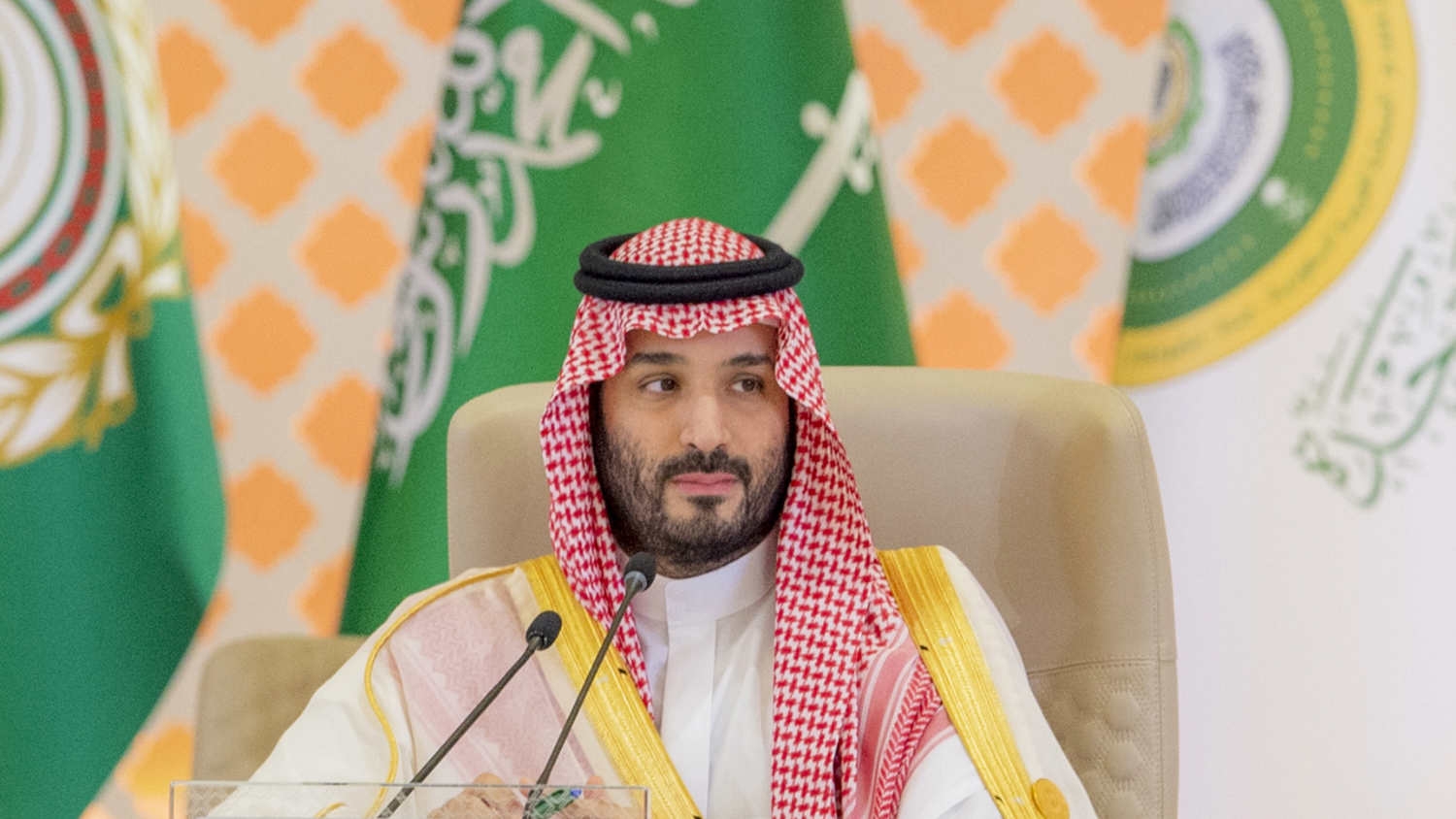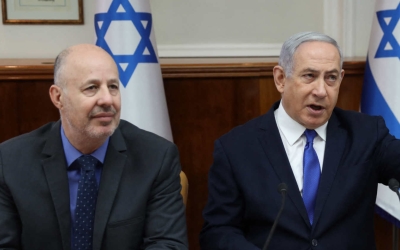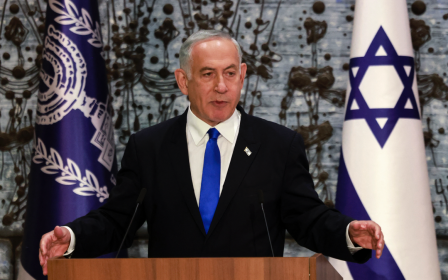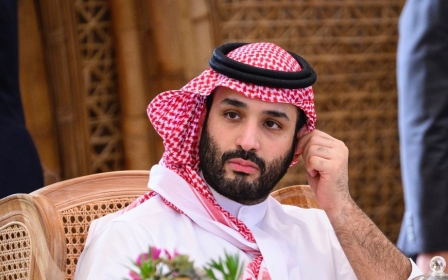Saudi Arabia-Israel normalisation: Crown prince 'wants something outstanding'

US and Israeli officials are putting a chill on reports that Saudi Arabia and Israel are inching closer to establishing official relations, underlining how Crown Prince Mohammed bin Salman has time on his side to normalise ties.
A senior US official told lawmakers on Wednesday there had been "a lot of hyperventilation in the press, a lot of excitable rumint" that a breakthrough between Saudi Arabia and Israel was near.
"Especially in the Israeli press," assistant secretary of state Barbara Leaf told a Senate hearing.
"They're just electric with the idea that Saudi Arabia might take that step."
The day before, Israel's national security advisor, Tzachi Hanegbi, suggested there was daylight between the Biden administration and Prime Minister Benjamin Netanyahu's government, which he said was "in a fog" on normalisation talks between Washington and Riyadh.
New MEE newsletter: Jerusalem Dispatch
Sign up to get the latest insights and analysis on Israel-Palestine, alongside Turkey Unpacked and other MEE newsletters
The comments follow a deluge of reports - primarily within the Israeli press - providing near-daily updates on the Biden administration's back and forth with Israel and Saudi Arabia.
Hopes for an agreement rose in early May when top Biden advisor Jake Sullivan declared that Saudi-Israel normalisation was in the US national security interest.
'If Saudi did this deal with a Republican president, it would cement the idea they are a partisan player'
- Prem Kumar, Albright Stonebridge Group
A report by Axios that the White House aimed to seal a deal within 6-7 months, before the next US elections, added to the frenzy.
"The rhetoric has definitely moved," Yoel Guzansky, a Gulf expert at the Tel Aviv-based Institute for National Security Studies, told Middle East Eye.
"That was the first time the Biden administration put normalisation out there so publicly as a priority, but when you move past the rhetoric, not all that much has changed from a year ago."
On Friday, the State Department announced that Secretary of State Antony Blinken will travel to Saudi Arabia next week for talks on strategic cooperation expected to include normalisation.
A senior US official said the administration would continue to push for a deal while also pursuing progress "short of formal diplomatic normalization."
Keeping narrative alive
Aziz Alghashian, based in Riyadh and a fellow at Sepad with a research focus on Israel-Saudi ties, told MEE that the drip-drip of media leaks had reached an "annoying crescendo" and "smacked of desperation by Israel to appear closer to Saudi Arabia."
"In order for this Israeli government to survive, they need to keep alive the narrative that normalisation with Saudi Arabia is incredibly imminent," he said. "When in fact, it isn't."
To be sure, Saudi Arabia and Israel are closer now than at any time in history. Saudi Arabia was not a party to the 2020 Abraham Accords that saw the UAE, Morocco and Bahrain normalise ties, but it has been impacted.
The two cooperate quietly on security and intelligence to combat Iran. The US move to put Israel in Centcom - US military command for the Middle East - expanded those defence links. Last year, Saudi Arabia and Oman publicly joined Israel in US-led naval exercises for the first time.
This month, Netanyahu and Israeli Foreign Minister Eli Cohen spoke on the phone twice to Mohammed bin Salman within one day as part of negotiations to allow direct commercial flights to the kingdom for Muslims from Israel making the Hajj pilgrimage.
"There is no doubt that we are closer than ever to a deal, given the fact that 'ever' was almost zero a few years ago," Aaron David Miller, former State Department advisor, now a senior fellow at the Carnegie Endowment for International Peace, told MEE.
For its part, the Biden administration is looking to patch up ties with Riyadh that are under strain over human rights and oil production. The kingdom’s decision in March to reestablish ties with Iran in a deal brokered by China signalled Saudi’s drift from Washington.
"The administration feels it over-course corrected," Miller said. "Now, there is no more talk of Riyadh as a pariah and they are looking for a way to strengthen the relationship."
A normalisation deal would showcase US diplomatic heft in the region when allies complain of waning interest. It would also be a triumph for Netanyahu, who returned to office last year with a pledge to expand the Abraham Accords but has had to pivot to domestic challenges after backlash to his contentious judicial overhaul.
"Biden wants it more than ever. Bibi wants it more than ever. But Mohammed bin Salman can wait," Alghashian told MEE.
Unlike the 2020 Abraham Accords, where talks between Arab states and Israel were conducted in secret, Saudi Arabia's opening demands were leaked for the world to see. In exchange for normalising ties, it wants security guarantees from the US, help in developing a civilian nuclear programme and fewer restrictions on arms sales.
"The obstacle boils down to whether the Saudi demands can be met," Miller said. "And the price they want is very high."
The elephant in the room is Saudi Arabia's position on Palestine. In January, Saudi Arabia's top diplomat said that the kingdom will not normalise ties until an independent Palestinian state is created, and the Saudis have not publicly indicated a change to that position.
Guzansky said Saudi demands for an independent state are likely a negotiating position, but "Riyadh's wishlist to normalise definitely includes something in the Palestinian arena, it's below the threshold of state, but it must be addressed and it’s not clear this [Israeli] government can do that."
Building consensus
Saudi Arabia's demands require major lobbying in Congress on behalf of the Biden administration, at a time when members of the president’s own party want to curtail the relationship over human rights concerns. Many lawmakers have also expressed unease with its nuclear ambitions.
On Wednesday, US Senator Chris Murphy elicited a public pledge from Leaf, the State Department's top Middle East official, that the administration would not make security guarantees to Saudi Arabia without first seeking congressional approval.
Current and former US officials tell MEE that if the Biden administration wanted, it could override congressional opposition to arms sales with a presidential veto, but there is little appetite to do so given the delicate state of US-Saudi ties and the upcoming presidential election.
'MBS feels he is in a very strong position and doesn’t have to give in to anyone'
- Abdullah Baabood, Carnegie Middle East Center
"The Biden administration does not want to go to war with members of the Democratic Party for this deal," Miller told MEE.
But building consensus in Congress is more difficult now that US-Israel ties have hit a rough patch. Netanyahu leads a government made up of once-fringe, far-right lawmakers and his judicial overhaul has become a lightning rod issue within the Democratic Party. The Israeli leader has yet to be invited to the White House.
Israel itself has been vague on how it would respond to the Saudi nuclear programme. Hanegbi, the Israeli national security advisor, said the file would have to pass through US counter-proliferation regulations first, but a final deal wouldn’t be clinched without consulting Israel, where a debate is raging on how to address Riyadh’s nuclear ambitions.
"If the price for peace is giving Saudi Arabia enrichment capabilities, I think it's too high," Guzansky told MEE. "Who knows what MBS would do in five years or even next year with that card."
The US requires countries looking to cooperate on nuclear technology to sign a 123 agreement, which bans them from enriching and selling uranium - a Saudi goal.
'MBS wants something outstanding'
The administration has tried to trim Riyadh’s sails by emphasising the political benefits of an agreement. Republican Senator Lindsey Graham even told the Saudis that normalisation during Biden’s term could help them build goodwill in Washington.
"That’' an argument the Saudis have internalised," Prem Kumar, a former advisor to President Obama on the Middle East who is now at the global advisory firm, Albright Stonebridge Group, told MEE.
"They realise that if they did this deal with a Republican president, it would just cement the idea that Saudi Arabia is a partisan player in Washington," he added.
Abdullah Baabood, a nonresident scholar at the Malcolm H. Kerr Carnegie Middle East Center, believes that card is overplayed in the DC establishment.
'Biden wants it more than ever. Bibi wants it more than ever. But Mohammed bin Salman can wait'
- Aziz Alghashian, foreign policy expert
"We saw what the Saudis did to Biden when he visited," he said, referring to Biden's July 2022 trip to the kingdom. "If Saudi wanted to get closer to the Democrats, they could have responded to the visit a lot more positively. But they didn't care."
Crown Prince Mohammed bin Salman is pursuing a foreign policy that is more independent from Washington.
He is riding a boom in oil prices that have buoyed state coffers and put the kingdom back at the centre of global energy security concerns.
"MBS feels he is in a very strong position and doesn’t have to give in to anyone," Baabood said. "MBS wants something outstanding to normalise."
Costly military interventions in hotspots like Yemen that defined the crown prince’s early rule have given way to efforts to position Riyadh as a mediator.
Besides restoring ties with Iran, he welcomed Syrian President Bashar al-Assad back to the Arab fold and hosted a Hamas delegation alongside representatives of the Palestinian Authority. Israel and the US label Hamas a terrorist group.
But Kumar believes normalising ties with Israel fits with the foreign policy pivot.
"It would potentially demonstrate that Saudi Arabia can have a strong relationship with both Iran and Israel," he told MEE. "No other Arab country would be able to claim that mantle."
Netanyahu's far-right government and tensions in the occupied West Bank, especially at the Al-Aqsa Mosque complex in East Jerusalem, also muddy the equation with Saudi Arabia.
"I think it's an extremely risky move for Saudi Arabia as it tries to act as a leader of the Arab world. It would undermine their reputation," Baabood said.
“Right now Saudi Arabia enjoys the benefits of security cooperation with Israel, without having to defend those ties publicly.”
This article is available in French on Middle East Eye French edition.
Middle East Eye delivers independent and unrivalled coverage and analysis of the Middle East, North Africa and beyond. To learn more about republishing this content and the associated fees, please fill out this form. More about MEE can be found here.





